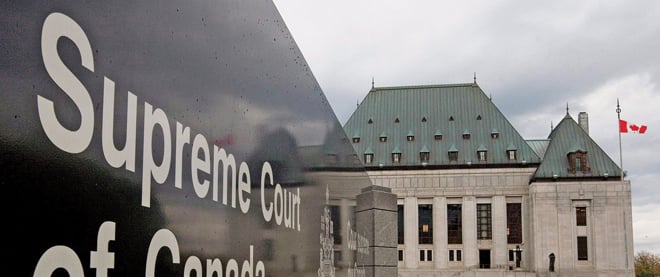The man who got passed over for the Supreme Court
How was criminal law ‘genius’ David Doherty neglected again?
Adrian Wyld/CP
Share

The selection of a new Supreme Court of Canada judge is a process so shrouded in secrecy that it’s an irresistible invitation for lawyers to speculate, gossip and argue about the best candidate. Yet after the Prime Minister announces an appointment, the legal community tends to close ranks, praise the new pick, and rarely mention those passed over. So it was this week, when Stephen Harper nominated Justice Michael Moldaver and Justice Andromache Karakatsanis, both of the Ontario Court of Appeal, to fill two Ontario vacancies on the top court.
But Don Stuart, a law professor at Queen’s University, after echoing the general consensus by admiring the nominees’ credentials, added an unusually blunt note of regret about a particular judge who didn’t get the nod—Justice David Doherty, also of the Ontario Court of Appeal. “Every person who is associated with criminal justice would know that David Doherty has written most of the leading judgements in most of the areas,” he told Maclean’s. “He’s our leading judge, really. It seems disappointing that he was not chosen.”
In fact, Doherty’s name has been on short lists of possible Supreme Court of Canada judges from Ontario going back to the 1990s, when then-prime minister Jean Chrétien was making the selections. He is far from the only eminent judge to be repeatedly passed over, but, at least on paper, he seemed an especially obvious contender this time. The two retiring judges being replaced are Justice Ian Binnie and Justice Louise Charron. Charron had been the court’s heavy lifter when it came to writing decisions on criminal law, which has lately made up about a third of its caseload.
Doherty happens to be a prolific writer of criminal law rulings, and has been since he was appointed to Ontario’s top court back in 1990. He’s been described as a “genius” in the field, an expert in key areas like the admissibility of evidence. He’s a forceful courtroom presence. Last June, as part of a panel hearing the federal and Ontario governments’ appeal of a landmark case that could see prostitution effectively decriminalized, Doherty pressed the government lawyers hardest to defend laws that make it difficult for prostitutes to work out of their homes. “I find it hard to understand,” he said, “why it’s not self-evident that these provisions harm the ability to carry out prostitution safely.”
In selecting Moldaver, Harper chose another respected criminal law specialist. Jean-Marc Leclerc, a veteran litigator at the Toronto firm Osler, said Doherty and Moldaver, both in their early sixties, have worked closely on many rulings. Last year, for instance, together with Justice Eleanore Cronk, they overturned a lower court’s sentence for terrorist Momin Khawaja, increasing his 10½-year sentence to life in prison, and writing that terrorism “must be dealt with in the severest of terms.”
Moldaver’s edge over Doherty might have less to do with their rulings than demeanor. One lawyer who has closely watched both judges described Moldaver as “everybody’s friend, a very collegial and approachable guy,” and Doherty as “very intense and private.” Stuart said Doherty’s “reputation for being a bit grumpy” might have weighed against him. On the other hand, Doherty reportedly has an irreverent sense of humour—he once named a basset hound after the late Bertha Wilson, the first woman to serve on the Supreme Court.
Veteran court watchers cautioned against trying to sort out the many intangibles that go into the complex appointment process. The federal government first consulted with provincial officials, judges, and prominent lawyers, creating a long list of candidates. Then a panel of five MPs whittled that down to a short list of six, from which the justice minister and, ultimately, the Prime Minister, chose.
Factors well beyond legal expertise and judgement come into play. Karakatsanis brings senior law and bureaucratic experience, but is also a woman who speaks French (along with English and Greek), coming to a court sensitive about both gender balance and bilingualism. She served as a senior Ontario official when Mike Harris was premier, and is well regarded by Harris Conservatives now serving in Harper’s government. Moldaver may have impressed some Conservatives by complaining publicly about defence lawyers clogging up the courts by raising baseless Charter of Rights and Freedoms arguments in criminal cases.
Of course, none of the decision makers, up to and including Harper, will reveal how much any of this weighed in their choices. In any case, University of Ottawa law professor Constance Backhouse says trying to guess how a judge will perform on the top court is an “exercise in futility.” At that level, judges’ ideological inclinations are notoriously hard to read, and their talents sometimes blossom late. Allowing for that unpredictability, she said Moldaver and Karakatsanis are “both fine appointments.” For fans of Doherty, watching what emerges from the court Harper is remaking must be tinged with a sense of what might have been.